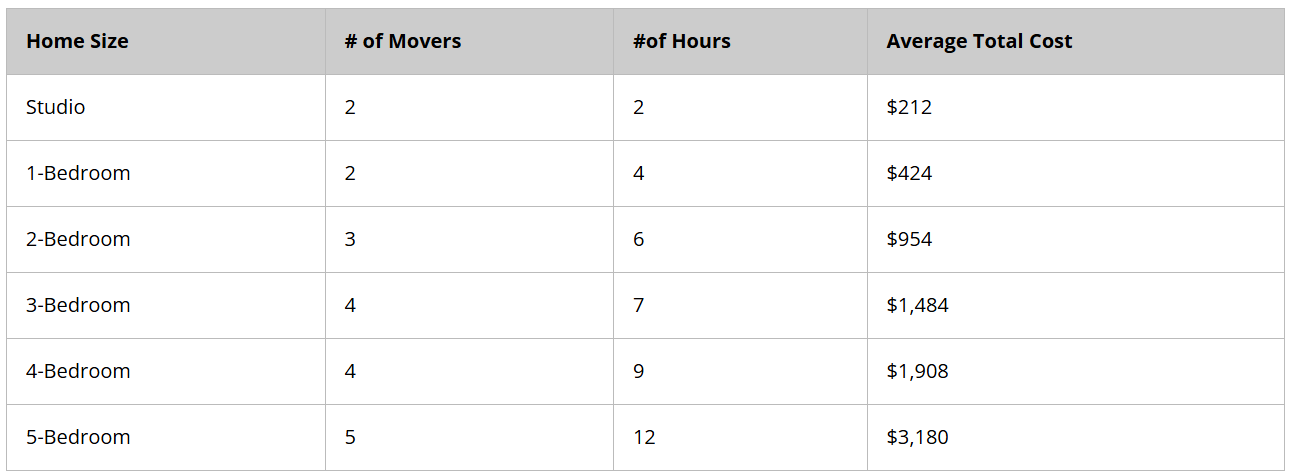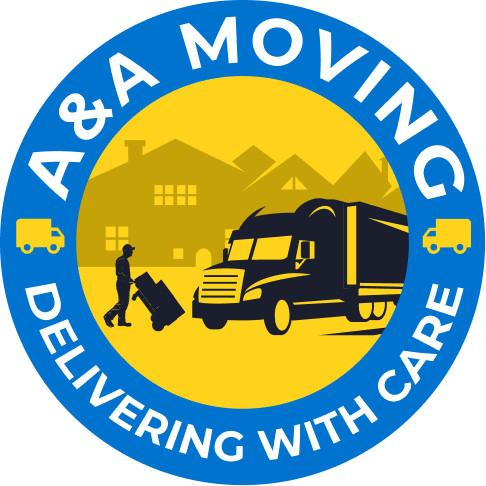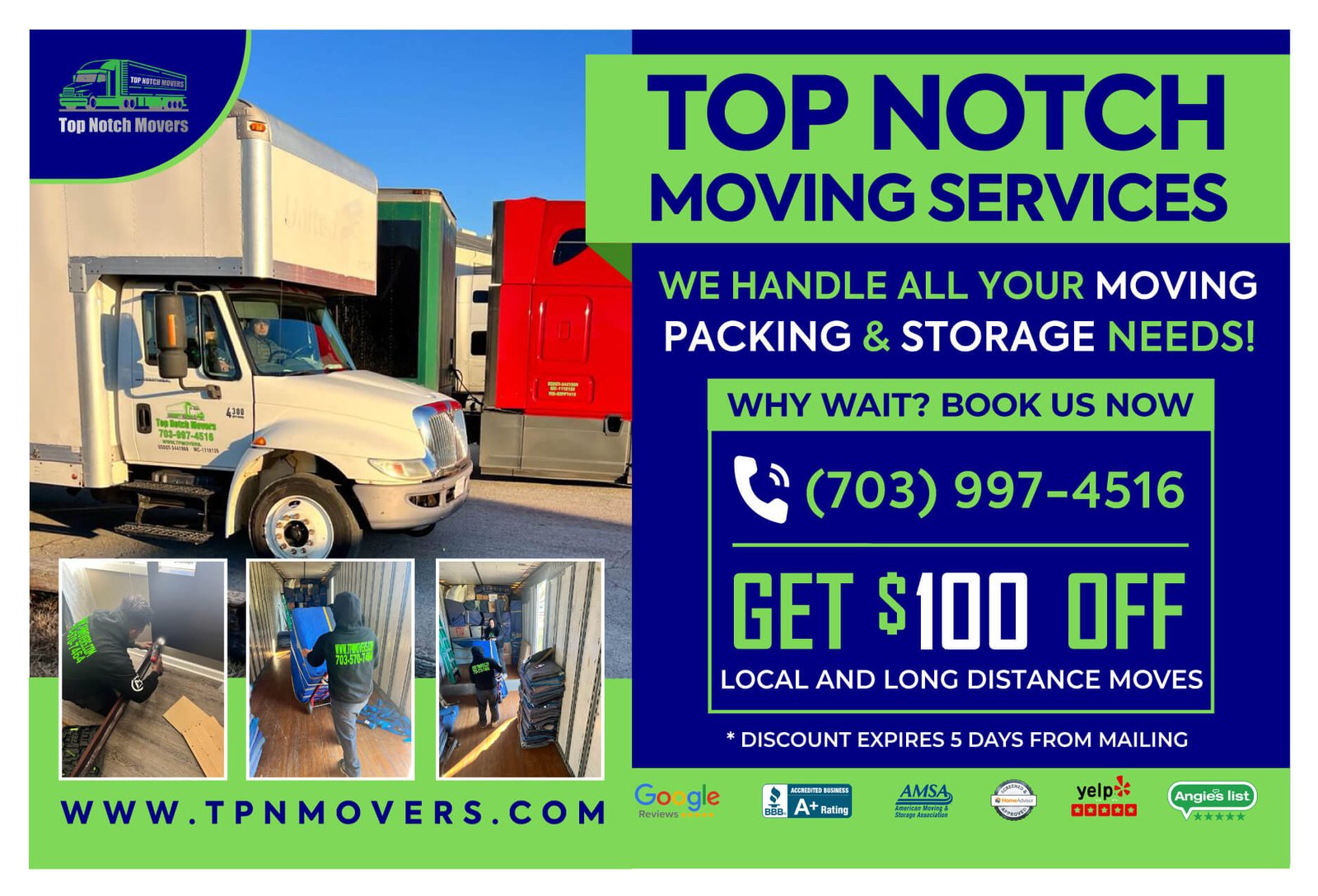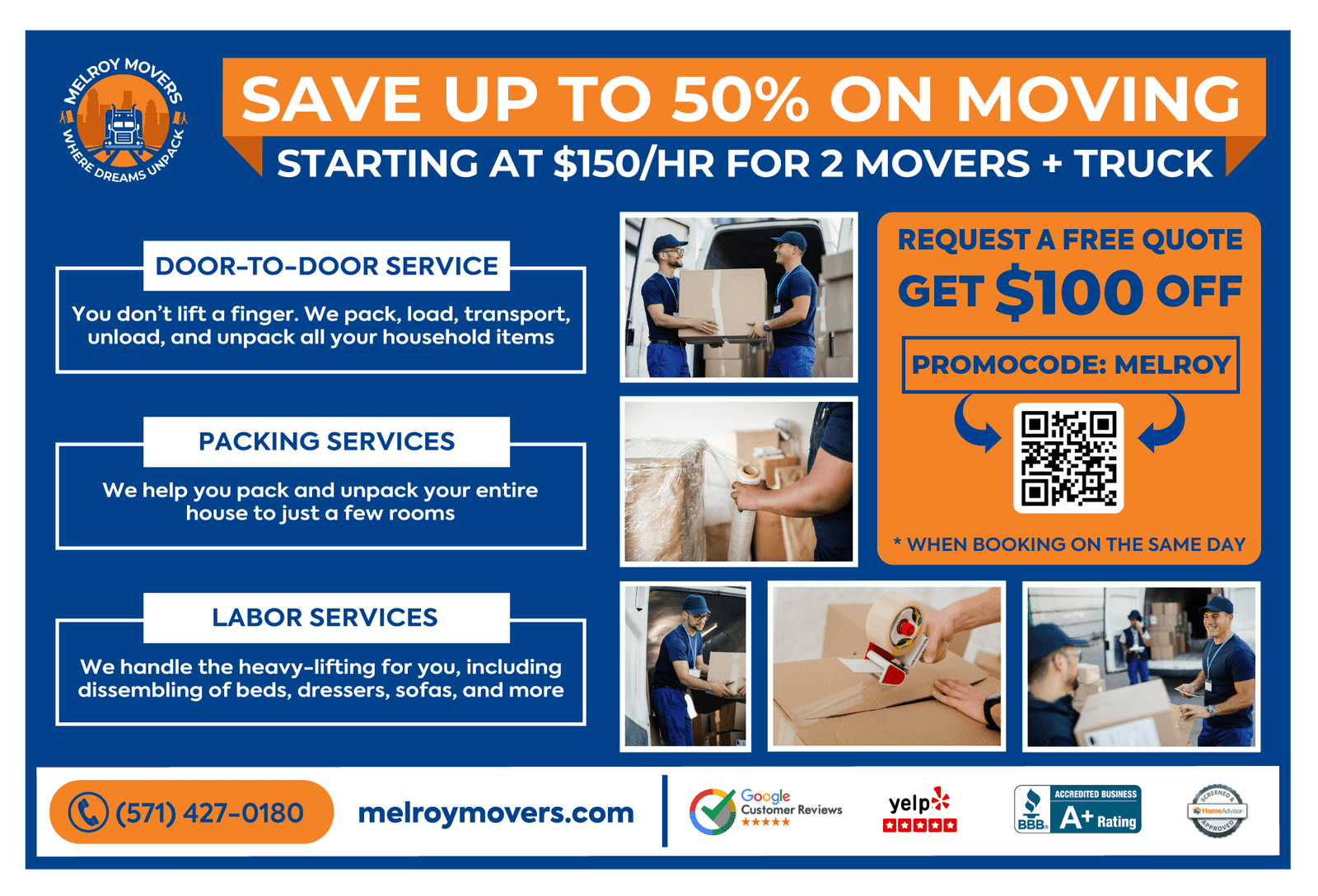Moving Cost Calculator for Moving Estimates
Our commitment to quality
Moving.com can help you prepare financially for any move. From our free moving cost calculator to our useful money-saving tips, here’s everything you need to know about calculating moving costs for your next relocation.
How much do movers cost?
The average cost of a local move is $1,250. The average cost of a long distance move is $4,890 (distance of 1,000 miles). These estimates are based on a 2 – 3 bedroom move of approximately 7,500 pounds.
Local move cost
Just moving from one neighborhood to another or perhaps a nearby town? That’s considered a local move. Local moves can range from a low of $501 for a studio apartment to $2,988 and higher for a 4-5 bedroom house. It all depends on the size of your home and how many items you have to move.

Cost of Movers Per Hour
The price range for hiring a labor-only company typically falls somewhere between $38-$75 per mover, per hour for local moves. So, two-movers working for four hours will cost about $424, on average. We’ve included a table to show the average total cost of movers (based only on home size and the typical hourly rate of $53 per mover per hour).

Long Distance Move Cost
Long distance moves cost more because long distance moving companies have to factor in gas prices, tolls and compensating drivers. The cost for a long-distance move can range from $1,123 to more than $14,107 depending on how many miles you’re moving and the size of your move.

How to Calculate Moving Costs
So how much will it cost to move? Try our free moving cost calculator to find out. Let us know where you’re moving from and the destination of your new home. Use the drop-down function to select the size of your move (in bedrooms), the packing services that you’ll need, and your move date. We’ll take all of these factors into consideration to give you an accurate cost estimate from top movers.
Factors that Affect Your Moving Cost
When calculating moving costs, don’t forget to factor in all necessary moving expenses and additional costs. These include:
- Travel fees – Travel fees add up quickly when moving a long distance. These fees take into account fuel costs, as well as labor costs for the time it will take for the movers to get from house A to house B.
- Size of your move – Moving a lot of stuff? Not only will the move take longer to complete, but your shipment of belongings will also be heavier. This can result in a cost increase. Rule of thumb: the more belongings you have to move, the more expensive your move will be.
- Packing services – While convenient, hiring movers to pack up your belongings could cost you an extra few hundred bucks or more. Of course, hiring packers may be well worth the money, as it saves you time, energy and the hassle of having to pack up a home.
- Moving add-ons – The cost of your move will be affected by any add-on services you choose to include. This could mean disassembling and reassembling furniture, moving of specialty items, and moving supplies provided by movers such as stretch wrap, felt pads and mattress bags.
- Storage – If you’re dealing with a complicated move, you may choose to have a moving company hold or store all belongings before, during or after a move. Just be prepared to pay extra for this service. Storage rates vary from moving company to moving company, so be sure to ask for specifics.
- Moving supplies – Unless you’re able to scrounge up enough free boxes for your move, you’ll need to plan on purchasing moving supplies. These could include cardboard boxes, plastic bins, bubble wrap, packing paper and any other packing materials needed for the move. To find out how many supplies you need, check our Moving Box Calculator.
- Moving date – Remember: when you move is just as important as how you move. That’s because the specific date of your move can affect the price dramatically. For example, a weekend move and/or a move during peak season tends to cost much more than a week-day, off-season move.
- Liability and valuation coverage – If you’re using a moving company, you’ll likely need to purchase some sort of liability coverage. Most moving companies offer multiple levels of protection including: Basic Release Value Protection and Full Value Protection. Keep in mind that you may want to purchase additional moving insurance from a third-party provider.
Additional Moving Costs and Fees to Consider
Depending on your moving needs, you may have to pay extra for these services and add-ons.
- Specialty moving – Moving specialty items often requires specific materials and skills. If you need to move a specialty item, such as a piano, hot tub, valuable artwork or grandfather clock, this will likely cost extra.
- Long carry fee – If a mover has to carry household items to and from the moving truck over a long distance, then you may be charged a long carry fee. This fee is incurred when a moving truck isn’t able to park close to your house.
- Stair carry fee – This fee is incurred when movers must carry belongings up and down several flights of stairs. It’s usually only necessary when homes have multiple stories and/or an above-average number of steps.
- Elevator fee – If your move requires an elevator (think: a high-rise apartment building), you may be charged an elevator fee.
- Unpacking service – Need help with unpacking your belongings and removing supplies and debris? You may need to pay movers a fee for this time-consuming service.
- Shuttle fee – Some movers offer shuttle services to transport belongings to and from the moving truck. This service is usually needed when the moving truck isn’t able to park near the home. For instance, if your home is located in a remote area without parking, you may need a shuttle to transport items from the home to the truck.
- Storage – Need storage before, during or after the move? You’ll have to pay extra for short-term, long-term and storage-in-transit services.
- Extra stops – If the mover needs to make extra stops, expect to pay more. The cost depends on the number of stops and the distance and labor involved in the stops. An example might be a mover stopping at your storage unit to pick up items before delivering everything to your new home.
- Expedited delivery services – Need to move fast? Long-distance moves can take up to two weeks. If you need items quickly, you may have to pay extra for expedited delivery services.
- Tipping – While tipping isn’t required, it’s certainly appreciated. It’s also a great way to say “thank you” for a job well done. If you plan to tip your movers, make sure to have cash on hand.
10 Easy Ways to Cut Moving Costs
Looking to save money on your next move? Here are several easy ways to cut costs when moving to a new home.
Get rid of your excess belongings – The easiest way to save money on a move is to simply get rid of unnecessary household items. Start the pre-move purging process early by cleaning out your closet. Then come up with a room-by-room decluttering plan. Donate unnecessary furniture, clothing and knick knacks. If you’re looking to sell items, try consigning them, hosting a garage sale or listing them on an online marketplace such as Craigslist. For more advice on how to get rid of your belongings, check out our step-by-step guide to the pre-move purge.
Rent a moving truck – Thinking of taking on a DIY move? You could save thousands of dollars by renting a truck and moving yourself. If moving a large household, consider renting the 26 ft. truck rental option from a reputable truck rental company. These large trucks are capable of holding four-plus bedrooms. To find a large moving truck that best fits your budget and needs, check out Moving.com’s truck rental center. Our truck rental center provides discounts on various truck rental companies in your area, as well as more information on the truck rental process.
Enlist friends and family to help – Unless you’re prepared to pay for professional movers or labor assistance, try asking friends and family for their help. Make sure to give them plenty of notice when asking for their assistance with a move. Also, be sure that those people are more than capable of lifting heavy boxes and appliances.
Find free moving boxes and supplies – A simple way to slash moving costs is to seek out free moving boxes and supplies from local liquor stores, large chain stores, grocery stores, recycling drop-off points, office buildings and schools. You may also be able to find free supplies on Craigslist, Freecycle, U-Haul Box Exchange, Nextdoor.com and local Facebook groups. In addition, you can save money on various supplies by visiting Moving.com’s online box center. We’ve partnered with UBoxes.com and UsedCardboardBoxes.com to help you purchase any necessary moving boxes and supplies at the best prices possible. Tip: Before ordering the boxes, figure out exactly how many you’re going to need for the move by using our Packing Calculator.
Rent a portable moving container – Renting a portable moving container is another great alternative to hiring full-service movers. The cost of renting a portable moving container depends on the length of time needed and the size of the container. To move with a container all you have to do is load it up, and the container company will do the rest. Popular moving container companies include: PODS, ABF’s U-Pack ReloCubes, United Mayflower’s container, Door-to-Door storage containers, U-Haul’s U-Boxes, and 1-800-PACK-RAT. To find a moving container that fits your budget and needs, check out Moving.com’s Get Free Quotes Now tool.
Look into moving discounts – Those with a AAA membership may be eligible to receive special moving and storage discounts. For example, Atlas Van Lines offers free Full Value Protection to AAA members moving to a new state. In addition, members of the military may be eligible to receive discounts on moving companies, truck rentals and more.
Pack yourself – This one may seem obvious, but you’d be surprised how much money you can save by packing yourself. While many professional movers offer some sort of packing assistance, the service doesn’t come cheap. Packing rates vary from moving company to moving company but are sure to cost at least several hundred dollars. To save money on packing, I recommend packing yourself or enlisting friends and family to help out.
Choose a less expensive move date – When you move can make a big difference in the overall cost of your relocation. In general, it’s best to opt for a mid-month, mid-week move. This is typically when demand for moving companies is lowest and therefore, costs are lower as well. While moving on a weekend may be more convenient, keep in mind that there are a limited number of weekends in a year, and most customers will be vying for one of those dates. Those who have the flexibility to miss a day of work to move during the week should do so. Also, keep in mind that more people move during the summer. In fact, roughly 70 percent of moves take place between Memorial Day and Labor Day. So, if possible, avoid moving during this peak moving season. Instead, opt for a late fall to winter move to save on costs.
Obtain quotes from multiple movers – Before hiring a moving company, be sure to shop around for the best price. We recommend obtaining quotes from at least three moving companies. The mover should conduct either an in-person inspection or a video survey of your belongings before giving you a quote. Don’t trust quotes you receive over the internet. For the most accurate quote possible, make sure that the mover is aware of any specialty items that require extra care. To hire a reliable and reputable mover, choose from Moving.com’s large network of licensed and insured professional moving companies.
Find out if your moving expenses are tax-deductible – Save those receipts! If you donated items to charities before the move, you should be able to deduct these donations from your taxes. Moving expenses are no longer tax-deductible and this change will stay in place at least through 2025. This means you can no longer claim this deduction on your federal return. There are exceptions if you need to amend a previous return prior to tax reform, or you are an active military member. The IRS has a tool to determine if you can deduct your moving expenses.v









